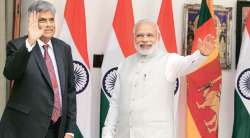To counterpoise China, Sri Lanka to offer port development to India: Report
Sri Lankan Prime Minister Ranil Wickremesinghe will reportedly be on India visit in the last week of April, with an agenda to review bilateral ties ahead of Prime Minister Narendra Modi’s visit in May to take forward economic cooperation.

Sri Lankan Prime Minister Ranil Wickremesinghe will reportedly be on India visit in the last week of April, with an agenda to review bilateral ties ahead of Prime Minister Narendra Modi’s visit in May to take forward economic cooperation.
According to a Times of India report, a part of the agenda for his visit will be to finalise the memorandum of understanding (MoU), which includes plans for joint development of Trincomalee Port.
It will include setting up a petroleum refinery and also a land lease agreement for Lankan Indian oil Corporation to develop storage oil tank farms – a project that India has been particularly keen to develop in the strategically located port.
The move by Sri Lanka, which already owes massive debt to China, is seen as an attempt to balance things out.
According to strategic thinker Brahma Chellaney, burdened with a heavy debt from China, Sri Lankais increasingly cognizant of and concerned about the growing implications that this situation hold for its strategic autonomy.
“For example, from a Chinese-financed Sri Lankan project, Hambantota is becoming a Chinese-owned and Chinese-run enclave in the Indian Ocean,” Chellaney was quoted by Times of India as saying.
“Jointly developing the Trincomalee port with India cannot counterbalance the Chinese leverage over Sri Lanka but it can help Colombo build countervailing influence. A Trincomalee port joint project with India also makes sense in terms of Sri Lanka's domestic ethnic considerations,” he added.
India, on the other hand, has not been much enthused about developing the Trincomalee port in the past as the project did not appear economically feasible.
As former Lankan President Mahinda Rajapaksa claims, the island nation under him had first approached India for developing the Hambantota port in south and allowed China to come in only after India refused the offer.
India had the same fear about Hambantota as it felt developing the port there was not going to be financially viable. While India was vindicated in the sense that the port failed to generate enough traffic, it now has to contend with a heavy Chinese presence there. Sri Lanka has now allowed China to build a special economic zone in Hambantota and also to further expand the Mattala airport.